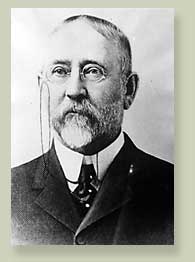Territorial Timeline

President Grover Cleveland appointed Eugene Semple governor
In 1887 Eugene Semple was appointed governor of Washington Territory by President Grover Cleveland. He was a Democratic Party appointee to an overwhelmingly Republican territory, which made him immediately unpopular. This increased the agitation for Statehood which would allow the people of Washington the right to elect their own choice for governor.
During Semple's first year in office the anti-Chinese riots which began in 1885 required a firm stand by the governor. He was unpopular with many because of this, but Semple had the support of the press and the President, and the unrest subsided without the violence which had occurred under his predecessor's administration.
The issue of women's suffrage reached a climax in 1887 when the Washington Territorial Supreme Court denied women the right to vote by overturning the latest women's suffrage law passed by the Legislature. Undeterred, the Legislature passed a new law for women’s suffrage which Governor Semple signed, but it did not go into effect because the new State Constitution, which was passed in 1889, omitted women's suffrage.
One of the bitterest controversies for Washington, the enormous land grants awarded to the Northern Pacific Railroad, reached a climax during Semple's administration. However the fight for the forfeiture of these lands was soon obscured by the issue of Statehood. Adequate transportation had become an accomplished fact and it was recognized that the Northern Pacific Railroad greatly contributed to the prosperity of Washington and enhanced its chances for Statehood.
In 1887 Eugene Semple was appointed governor of Washington Territory by President Grover Cleveland. He was a Democratic Party appointee to an overwhelmingly Republican territory, which made him immediately unpopular. This increased the agitation for Statehood which would allow the people of Washington the right to elect their own choice for governor.
During Semple's first year in office the anti-Chinese riots which began in 1885 required a firm stand by the governor. He was unpopular with many because of this, but Semple had the support of the press and the President, and the unrest subsided without the violence which had occurred under his predecessor's administration.
The issue of women's suffrage reached a climax in 1887 when the Washington Territorial Supreme Court denied women the right to vote by overturning the latest women's suffrage law passed by the Legislature. Undeterred, the Legislature passed a new law for women’s suffrage which Governor Semple signed, but it did not go into effect because the new State Constitution, which was passed in 1889, omitted women's suffrage.
One of the bitterest controversies for Washington, the enormous land grants awarded to the Northern Pacific Railroad, reached a climax during Semple's administration. However the fight for the forfeiture of these lands was soon obscured by the issue of Statehood. Adequate transportation had become an accomplished fact and it was recognized that the Northern Pacific Railroad greatly contributed to the prosperity of Washington and enhanced its chances for Statehood.
After his term as governor, Semple moved to Seattle and organized the Seattle and Lake Washington Waterway Company. He died in San Diego in 1908.